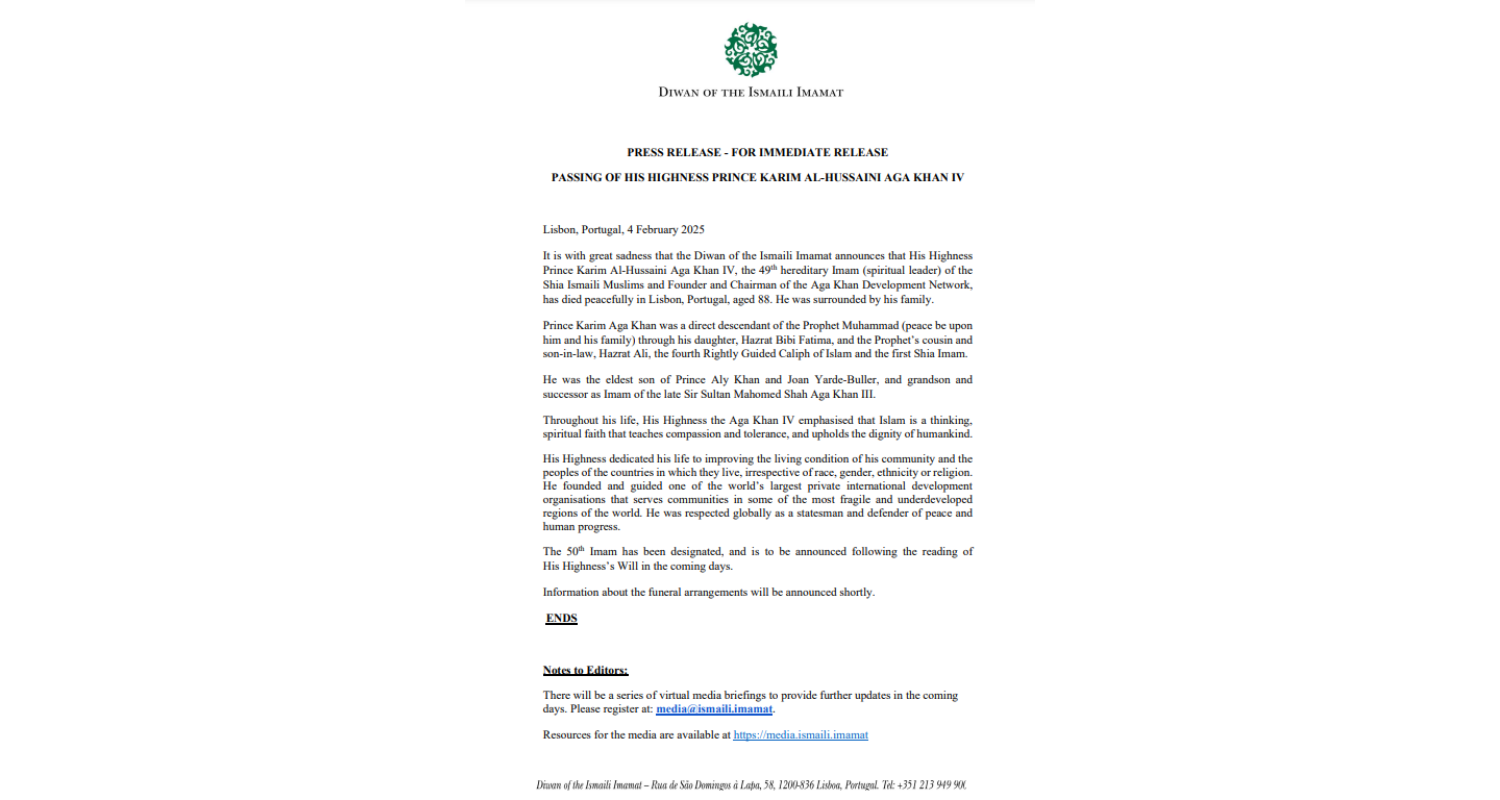Prince Karim Aga Khan IV, spiritual leader of millions of Ismaili Muslims and a prominent philanthropist, passed away peacefully on Tuesday in Lisbon, Portugal, at the age of 88, surrounded by his family.
A statement issued by the Diwan of the Ismaili Imamat confirmed his demise, stating, “It is with great sadness that the Diwan of the Ismaili Imamat announces that His Highness Prince Karim Al-Hussaini Aga Khan IV, the 49th hereditary Imam (spiritual leader) of the Shia Ismaili Muslims and Founder and Chairman of the Aga Khan Development Network, has died peacefully in Lisbon, Portugal, aged 88. He was surrounded by his family.”

Born on 13 December 1936 in Creux-de-Genthod near Geneva, Switzerland, the Aga Khan inherited his role as the 49th hereditary imam of the Shia Imami Ismaili Muslims in 1957, succeeding his grandfather, Sir Sultan Mahomed Shah Aga Khan III, who bypassed his son, Aly Khan.
At just 20 years of age and studying at Harvard University, the young prince assumed the mantle of leadership, described by his grandfather as a man “brought up amid the new age.”
Also read: Trump announces withdrawal from UNHRC, halts Palestine funds
Despite the immense responsibility thrust upon him, Prince Karim returned to Harvard after his grandfather's demise, determined to complete his education.
"I was an undergraduate who knew what his work for the rest of his life was going to be,” he remarked in a 2012 interview with Vanity Fair. “I don’t think anyone in my situation would have been prepared.”
His Highness earned global respect not only for his spiritual leadership but also for his philanthropic and development initiatives.
Through the Aga Khan Development Network (AKDN), he championed education, healthcare, and rural development in some of the world’s most deprived regions.
Hospitals bearing his name were established in Bangladesh, Afghanistan, and Tajikistan, where his investments revitalised struggling local economies.
A keen patron of culture and architecture, he founded the Aga Khan Award for Architecture, which is regarded as one of the most prestigious accolades in architectural circles. He also established programmes for Islamic architecture at both Harvard and MIT.
The Aga Khan was a steadfast proponent of interfaith harmony and cultural preservation.
While he avoided political entanglements, he was seen as a bridge between Muslim societies and the West. Queen Elizabeth II granted him the title of “His Highness” in 1957, recognising his stature as a global figure.
His influence extended beyond spiritual matters to the realms of business and culture.
Reports estimated his personal wealth to be in the billions. His Ismaili followers, who have a duty to tithe up to ten per cent of their income to the imam, viewed him as a steward rather than a mere figurehead.
“We have no notion of wealth accumulation being evil,” he stated in 2012. “The Islamic ethic is that if God has given you the capacity or good fortune to be a privileged individual in society, you have a moral responsibility to society.”
Prince Karim Aga Khan IV is survived by three sons and a daughter. His family has not yet announced his successor.
Also read: Hezbollah announces funeral of slain Hassan Nasrallah on 23 February


